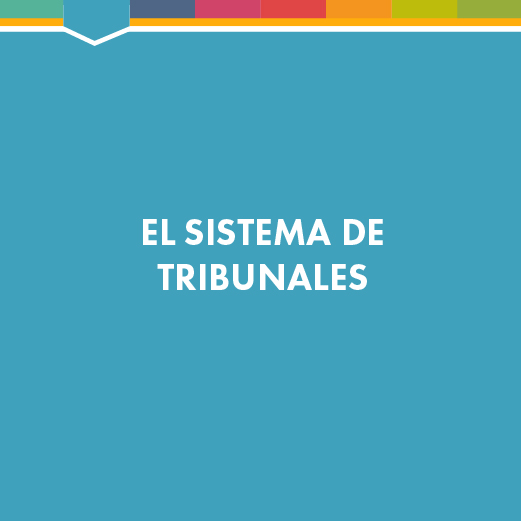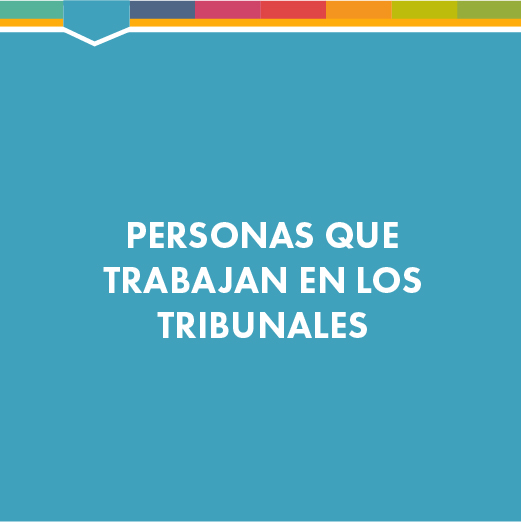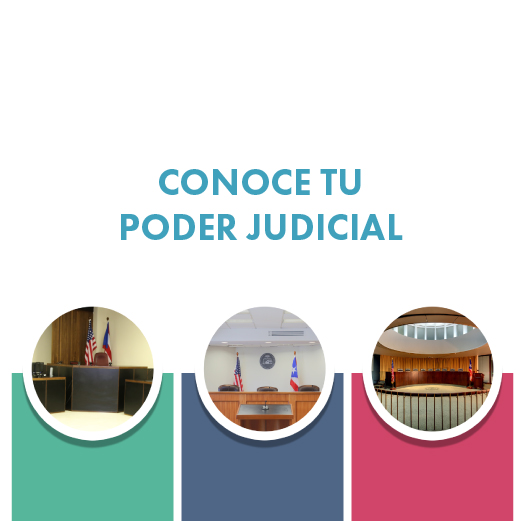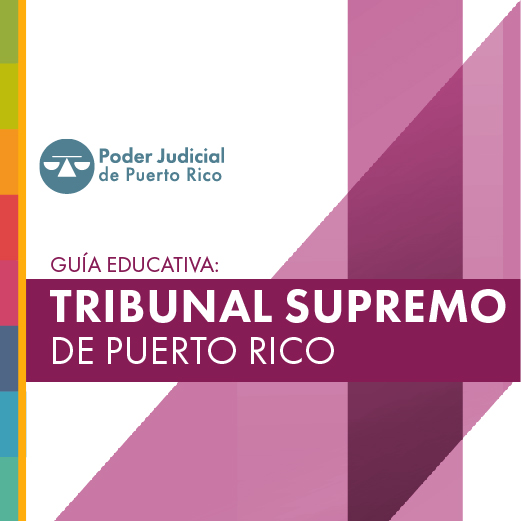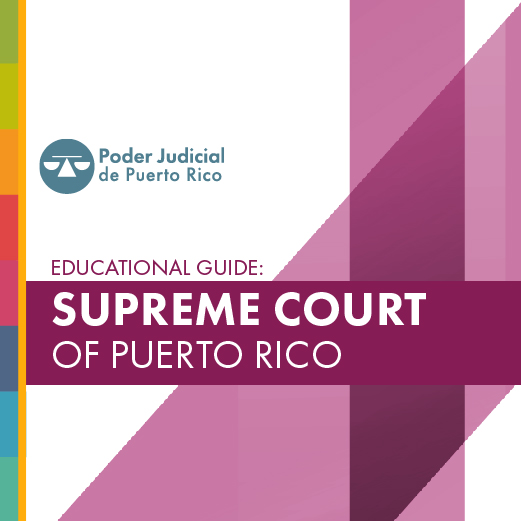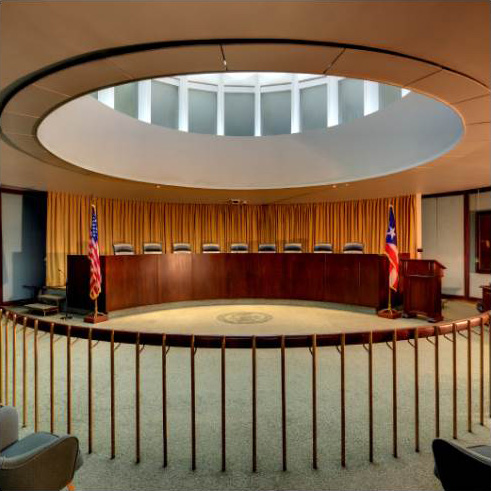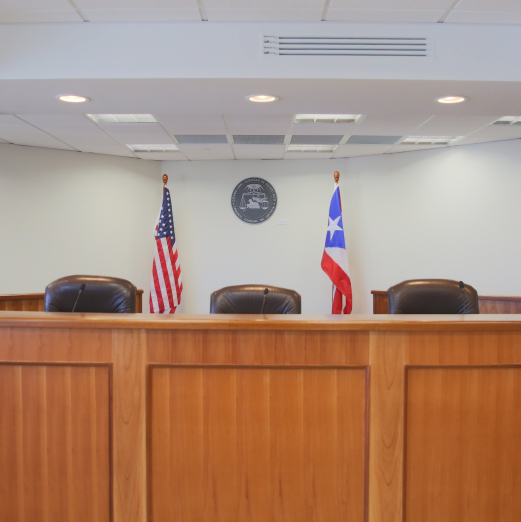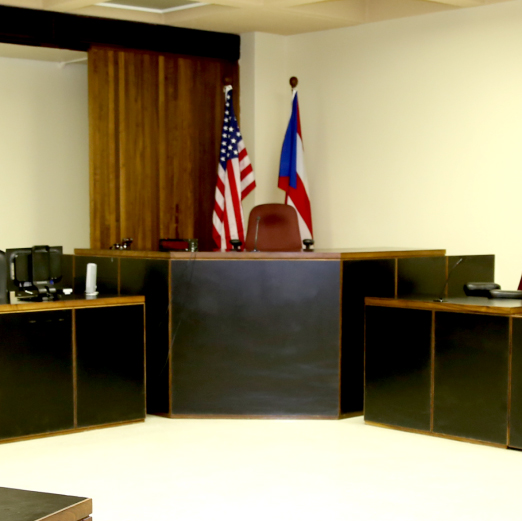
Court System
El Sistema de Tribunales es una estructura organizacional del Poder Judicial de dos ámbitos: el judicial y el administrativo. Por un lado, el aspecto judicial se refiere a la organización y composición de los tribunales en Puerto Rico. Por otro lado, el aspecto administrativo trata sobre cómo funciona y se administra el Poder Judicial.
En síntesis, el Sistema de Tribunales está compuesto por: el Tribunal de Primera Instancia, el Tribunal de Apelaciones, el Tribunal Supremo y la Oficina de Administración de los Tribunales.
Tribunal General de Justicia
¿Qué es un tribunal?
El Tribunal es el lugar donde acuden las personas cuando no han podido resolver problemas de manera directa con otra parte o cuando quieren reclamar un derecho. En los tribunales trabajan los jueces o las juezas que resuelven los casos y las controversias que se le presentan mediante la aplicación e interpretación de las leyes y la jurisprudencia (norma o doctrina establecida por el Tribunal Supremo, que es aplicable a otros casos de naturaleza o controversias similares que puedan suceder luego entre otras personas).
¿Qué tipos de casos se ven en los tribunales?
Civiles
Incluyen casos sobre herencias, daños y perjuicios, familia (adopción, custodia, pensión alimentaria, etc.), cobro de dinero, ejecuciones de hipoteca, corporaciones, entre otros.
Criminales
Se caracterizan porque los inicia el Ministerio Público, es decir fiscales y fiscalas representando al Estado o al Pueblo de Puerto Rico, contra una o varias personas. El objetivo del pleito es penalizar a la persona que se sospecha incurrió en una conducta que está prohibida por ley y se considera un delito. Para ello, el Ministerio Público debe probar más allá de duda razonable que la persona lo hizo.
Por otro lado, el ordenamiento jurídico provee un procedimiento especial para procesar a personas menores de edad que cometen faltas. Se le llama “falta” a la conducta que, de haber sido cometida por una persona adulta, sería un delito.
¿Qué personas trabajan en los tribunales?
Alguacil o alguacila
Tiene la función de mantener la seguridad y el orden en los tribunales y hacer cumplir las órdenes. Por ejemplo, cada sala del Tribunal General de Justicia tiene alguaciles asignados o alguacilas asignadas para mantener el orden. El alguacil o la alguacila también hace cumplir órdenes de un juez o una jueza fuera del tribunal.
Examinadores o examinadoras de pensiones alimentarias
Estos funcionarios o estas funcionarias del Tribunal, licenciados o licenciadas en Derecho, son las primeras personas en atender los casos de pensiones alimentarias, evaluarlos y hacer recomendaciones a los jueces o las juezas. Además, celebran vistas, evalúan prueba y rinden un informe ante el Tribunal sobre sus recomendaciones para fijar o modificar una pensión alimentaria.
Juez o jueza
Resuelve los casos y las controversias que se presentan ante el Tribunal.
Secretario o secretaria de sala
Es quien maneja el equipo de grabación para grabar el audio de todo lo que ocurre en la sala y toma notas de lo que ocurre durante las vistas. Luego, prepara un documento que se conoce como minuta, en el que se escribe todo lo expuesto por las partes en sala.
Secretario o secretaria auxiliar
Es quien recibe las peticiones y mociones que las personas presentan y se encarga de notificar las órdenes y sentencias.
Trabajador o trabajadora social del Tribunal
Es quien asesora y trabaja como perito o perita del Tribunal en ciertos casos. Es decir, al tener un conocimiento especializado, le hace recomendaciones al juez o a la jueza. Este o esta profesional colabora con el juez o la jueza para el mejor desempeño de sus funciones en la administración de la justicia y ofrece asesoramiento social de situaciones familiares y asuntos de personas menores de edad ofensoras referidas por los jueces o las juezas de familia y menores. Asimismo, mediante un Informe Social Forense recomienda las acciones a considerar para que el juez o la jueza decida el caso y ofrece supervisión a los o las menores que están bajo la supervisión del Tribunal conforme a la Ley de Menores.
Mediador o mediadora
Es un funcionario o una funcionaria del Poder Judicial que está debidamente certificado o certificada para desempeñarse como árbitro, árbitra, intermediario o intermediaria imparcial en la solución de conflictos o controversias. Este funcionario o esta funcionaria ofrece su conocimiento y ayuda a las personas para que, sin favorecer a ninguna de las partes, puedan llegar a acuerdos satisfactorios para todas las personas involucradas en la situación. Trabajan en los Centros de Mediación de Conflictos, los cuales están ubicados en las 13 regiones judiciales.
¿Qué funcionarios o funcionarias de otras ramas de gobierno participan de los procesos en los tribunales?
Fiscal o fiscala
Es un abogado o una abogada del Departamento de Justicia que se encarga de investigar y presentar los cargos y la evidencia del caso en contra de una persona que se sospecha cometió un delito. Representa al Pueblo de Puerto Rico en casos criminales y al Ministerio Público o Estado en asuntos civiles.
Policía
Funcionario o funcionaria de la Policía de Puerto Rico cuya función es asegurarse de que la comunidad cumpla con las leyes y ayudar a mantener el orden público. En muchas ocasiones, es quien presenta las denuncias y comparece como persona testigo en todas las etapas del proceso criminal.
Procurador o procuradora de menores
Es un abogado o abogada del Departamento de Justicia que se encarga de implementar la Ley de Menores y de investigar todas las querellas referidas por la Policía donde se alegue la comisión de una falta por personas menores de 18 años. Hay casos en que los o las menores de edad son juzgados o juzgadas como personas adultas; sin embargo, estos casos son excepcionales cuando surgen circunstancias establecidas por ley.
Procurador o procuradora de familia
Es un abogado o abogada del Departamento de Justicia que representa a las personas menores de edad y a las personas incapacitadas en los procesos de familia (maltrato de menores, adopción, entre otros).
¿Cuáles otras personas pueden participar en un caso cuando asumen un rol o una función particular?
Abogados o abogadas
Personas con estudios en Derecho y licencia para practicar la profesión en Puerto Rico, encargadas de representar a sus clientes. Hay abogados o abogadas que tienen oficinas o bufetes y ofrecen sus servicios profesionales a la persona que les contrata directamente. La persona que contrata los servicios del abogado o de la abogada será responsable de satisfacer lo que cuestan sus servicios.
Por otra parte, hay abogados o abogadas que trabajan para alguna oficina que brinda servicios legales de manera gratuita a las personas que cumplen con ciertos requisitos. La Sociedad para la Asistencia Legal y Servicios Legales de Puerto Rico son ejemplos de estas oficinas.
También el Tribunal puede asignar a un abogado o una abogada que represente a clientes que no pueden pagar dichos servicios profesionales; se les conoce como abogados o abogadas de oficio. Son profesionales del derecho que tienen oficina y el Tribunal les designa los casos de manera pro bono a base de unas listas.
Jurado
Personas seleccionadas al azar, a base de un registro, para que cumplan con su deber de servir en un juicio. Las personas que constituyen el jurado son representativas de la comunidad y, en Puerto Rico, se escogen para emitir un veredicto en un caso criminal luego de que ante el Tribunal se presente prueba. Algunos de los requisitos para ser jurado son: ser mayor de 18 años; saber leer y escribir español; estar física y mentalmente apto o apta para servir como jurado; y residir legalmente en Puerto Rico, durante un año y 90 días previos al juicio.
Testigo
Persona que tiene conocimiento personal de unos hechos que son importantes para decidir un caso y que se le cita para exponer ante el Tribunal lo que conoce de estos hechos.
Peritos o peritas
Personas expertas en distintas áreas del saber que, por sus estudios, experiencias y dominio del tema, se contratan para que puedan comparecer como personas testigos y ofrecer su opinión profesional sobre el tema particular que se evalúa en el juicio.
¿Cuál es el Tribunal de Primera Instancia?
El Tribunal de Primera Instancia fue creado por ley y funciona como el primer escalón del sistema judicial. Es el lugar donde acuden físicamente las personas cuando no han podido resolver problemas o controversias de manera directa con la otra parte o cuando quieren reclamar un derecho.
El Tribunal de Primera Instancia es un tribunal de jurisdicción general con autoridad para actuar en todo caso o controversia que se pueda resolver y que surja dentro del territorio de Puerto Rico. “Jurisdicción” se refiere al poder que tiene el Tribunal para atender un asunto y emitir una decisión, que las partes en el pleito deberán cumplir. Las vistas de los casos son grabadas en audio. Estas grabaciones se guardan y el contenido se transcribe. Se mantiene un expediente judicial de cada caso.
El Tribunal de Primera Instancia tiene sedes y salas en las que celebran sesiones los jueces y las juezas superiores, así como los jueces y las juezas municipales.
¿Cuál es el Tribunal de Apelaciones?
El Tribunal de Apelaciones fue creado por ley y funciona como el segundo escalón o nivel en los tribunales de Puerto Rico ya que es un foro intermedio entre el Tribunal Supremo y el Tribunal de Primera Instancia. Es el foro apelativo al cual las partes que no estén de acuerdo con el resultado de una determinación o decisión pueden presentar por escrito su posición ante un panel de no menos de tres jueces o juezas. Este panel revisará las determinaciones del Tribunal de Primera Instancia y de los organismos y las agencias administrativas. Para ello, se le presentan todos los documentos que forman parte del expediente del caso. Las partes no acuden físicamente a exponer sus puntos de vista. No obstante, el Tribunal de Apelaciones puede celebrar vistas orales en las que los abogados y las abogadas acuden físicamente a presentar y explicar sus casos ante el panel de jueces o juezas.
¿Cuál es el Tribunal Supremo?
Como surge de su nombre, el Tribunal Supremo es el de más alto rango y de última instancia en Puerto Rico. El Tribunal Supremo es el único que existe por mandato constitucional y tiene la función principal de interpretar la Constitución y las leyes del Estado Libre Asociado de Puerto Rico. Además, tiene la función de analizar la validez constitucional de las leyes aprobadas por la Asamblea Legislativa, así como actuaciones oficiales de las otras ramas gubernamentales. El Tribunal Supremo es el tercer escalón o nivel de tribunales; es un tribunal apelativo en el que se presentan todos los documentos que forman el expediente del caso que ya se ha visto en el Tribunal de Primera Instancia y en el Tribunal de Apelaciones.
Hojas informativas
Material educativo adicional
Guías educativas
Recorridos virtuales
The Court System is an organizational structure of the Judicial Branchy comprising two areas: judicial and administrative. On the one hand, the judicial aspect refers to the organization and composition of the courts in Puerto Rico. On the other hand, the administrative aspect deals with the operation and administration of the Judicial Branch.
In sum, the Court System includes the Court of First Instance, the Court of Appeals, the Supreme Court, and the Office of Administration of the Courts.
General Court of Justice
What is a court?
The court is the place where people go to when they have not been able to resolve their problems directly with the other party or when they want to assert a right. Judges work at the courts. They decide the cases and controversies that are brought to their attention by applying and interpreting statutory law and caselaw (rules laid down by the Supreme Court that apply to similar cases and controversies that might come about among other people).
What types of cases are heard in the courts?
Civil
Civil cases include inheritances, damages, family matters (adoption, custody, child support, etc.), collection of money, mortgage foreclosures, corporate matters, among others.
Criminal
Criminal cases are initiated by the prosecution (that is, the State or the People of Puerto Rico, represented by prosecutors) against one or several individuals. The objective of a criminal case is to punish the person suspected of committing an act that is prohibited by law and which is considered a crime. For this, the prosecution must prove beyond a reasonable doubt that the person did it.
On the other hand, the legal system provides a special proceeding to prosecute minors who commit faults or offenses. A fault is an act that, if committed by an adult, would be a crime.
Who works at the courts?
Marshal
This official is assigned with maintaining security, keeping order in the court, and enforcing orders. For instance, each court of the General Court of Justice has marshals to maintain order. The Marshal also enforces a judge’s orders outside the court.
Child Support Examiners
These court officials have a license to practice law. They are the first to hear and examine child support cases and make recommendations to the judges. They also hold hearings, weigh evidence, and render a report to the court with their recommendations to fix or modify child support.
Judge
They decide the cases and controversies brought before the court.
Courtroom Clerk
This person makes an audio recording of everything that goes on in the courtroom (using the court recording equipment) and takes notes of what happens during the hearings. Afterwards, this person drafts a document known as a “record of hearing,” setting down everything the parties stated in the court.
Assistant Clerk
This person receives the petitions and motions filed with the court, in addition to notifying the orders and judgments issued by the court.
Court Social Worker
This professional advises and works as an expert witness for the court in certain cases. In other words, by having specialized knowledge, he or she makes recommendations to the judge. This professional collaborates with the judge to help discharge the judge’s functions in the administration of justice. Furthermore, the social worker offers social advice on issues related to family and underage offenders referred to them by the family and minors court judges. Likewise, through a Forensic Social Report, this professional recommends the measures that the judge should consider in order to decide the case, and supervise the minors under court supervision pursuant to the Minors’ Act.
Mediator
This person is a Judicial Branch official who is duly licensed to act as an arbitrator or impartial intermediary in the resolution of conflicts and controversies. These officials offer their knowledge and help people reach agreements that satisfy all parties involved, without favoring any. They work at the Judicial Branch Conflict Mediation Centers located in the thirteen judicial regions.
Which officials from other government branches participate in court proceedings?
Prosecutor
This person is an attorney with the Department of Justice. This official is in charge of investigating and pressing charges and bringing evidence in the case against a person suspected of committing a crime. This person represents the People of Puerto Rico in criminal cases.
Police Officer
This is a member of the Police of Puerto Rico whose role it is to ensure that the people obey the laws of Puerto Rico and to help maintain public order. Many times, the police officer is the one who files the complaints and appears as a witness at all stages of the criminal proceeding.
Advocate for Minors Affairs
This person is an attorney with the Department of Justice whose role it is to enforce the Minors’ Act and investigate complaints filed by the Police where a person under the age of eighteen (18) is charged with committing a fault or offense. There are cases in which minors are tried as adults. However, these cases are exceptional and take place only under certain circumstances provided in the law.
Family Advocate
This person is an attorney with the Department of Justice who represents minors and persons with disabilities in family proceedings (child abuse, adoption, and others).
Who else may participate in a case with a particular role or function?
Attorneys
These are individuals who have studied Law, are licensed to practice in Puerto Rico, and are tasked with representing their clients. There are attorneys who have offices or firms and offer their professional services to the person who hires them directly. The person who retain an attorney’s services will be responsible for paying his or her fees.
On the other hand, there are attorneys who work for an office that gives free legal services to persons who meet certain requirements. The Legal Aid Society and the Puerto Rico Legal Services, Inc. are examples of such offices.
The court may also appoint an attorney to represent clients who cannot pay for said professional services. The latter are known as “court-appointed attorneys.” They are attorneys who have an office and the court assigns them a case pro bono from a roster of attorneys.
Juror
This is a person who is selected randomly from a registry to comply with their duty to serve as such in a trial. Some of the requirements to be a juror are: 18 years old or older; be able to read and write Spanish; be physically and mentally able to serve as a juror; and be a legal resident of Puerto Rico for a year and 90 days before the trial.
Witness
This person has personal knowledge of facts that are important to decide a case and is summoned to the court to state what they know of these facts.
Experts
These individuals have expertise in different areas of knowledge, who due to their studies, experiences, and mastery of a subject matter, are hired to appear as witnesses and offer their professional opinion on the particular matters being examined in the trial.
What is the Court of First Instance?
This court is created by law and is the first step in the court system. It is where individuals who have not been able to resolve their problems or controversies directly with the other party may physically go to or where they may go to when they want to assert a right.
The Court of First Instance is a court of general jurisdiction with the authority to act in any case or controversy that may be decided, and which arises within the territorial limits of Puerto Rico. Jurisdiction refers to the court’s power to hear an issue and render a decision that the parties to the case must follow. Audio recordings are made of the hearings in a case, and these recordings are preserved, and their contents are transcribed. A case file is kept for each case.
The Court of First Instance has courthouses and parts, and hearings are held by two types of judges: superior court judges and municipal judges.
What is the Court of Appeals?
The Court of Appeals was created by law and functions as the second step or level in the courts of Puerto Rico, since it is an intermediate forum between the Supreme Court and the Court of First Instance. It is the appeals forum to which the parties that do not agree with the result of a determination or decision may submit their position in writing to a panel of no less than three judges. This panel will review the determinations of the Court of First Instance and the administrative bodies and agencies. To this end, all the documents that are part of the case file are submitted. The parties do not physically appear to present their points of view. However, the Court of Appeals may hold oral hearings in which the attorneys physically appear to present and explain their cases before the panel of judges.
What is the Supreme Court?
The Court of Appeals is created by law and is a second step or level in the courts of Puerto Rico, as it is an intermediate court between the Court of First Instance and the Supreme Court. Its purpose is to serve as an appellate forum where parties who do not agree with the result of a decision made may present their position in writing before a panel of at least three judges. This panel will review the decisions of the Court of First Instance and of administrative bodies and agencies. To do this, the Court of Appeals it is presented with all the documents that are part of the record of the case. The parties do not visit the court physically to state their points of view. However, the Court of Appeals may hear oral argument, in which case the attorneys visit the court physically to present and explain their cases before the judges of the Court of Appeals.
Educational material
Revised: February 2023


